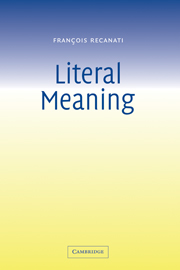Book contents
- Frontmatter
- Contents
- Acknowledgments
- Introduction
- 1 Two approaches to ‘what is said’
- 2 Primary pragmatic processes
- 3 Relevance-theoretic objections
- 4 The Syncretic View
- 5 Non-literal uses
- 6 From Literalism to Contextualism
- 7 Indexicalism and the Binding Fallacy
- 8 Circumstances of evaluation
- 9 Contextualism: how far can we go?
- Conclusion
- Bibliography
- Index
Introduction
Published online by Cambridge University Press: 08 January 2010
- Frontmatter
- Contents
- Acknowledgments
- Introduction
- 1 Two approaches to ‘what is said’
- 2 Primary pragmatic processes
- 3 Relevance-theoretic objections
- 4 The Syncretic View
- 5 Non-literal uses
- 6 From Literalism to Contextualism
- 7 Indexicalism and the Binding Fallacy
- 8 Circumstances of evaluation
- 9 Contextualism: how far can we go?
- Conclusion
- Bibliography
- Index
Summary
Around the middle of the twentieth century, there were two opposing camps within the analytic philosophy of language. The first camp – ideal language philosophy, as it was then called – was that of the pioneers, Frege, Russell, Carnap, Tarski, and so on. They were, first and foremost, logicians studying formal languages and, through them, ‘language’ in general. They were not originally concerned with natural language, which they thought defective in various ways; yet, in the 1960s, some of their disciples established the relevance of their methods to the detailed study of natural language. Their efforts gave rise to contemporary formal semantics, a very active discipline whose stunning developments in the last quarter of the twentieth century changed the face of linguistics.
The other camp was that of so-called ordinary language philosophers, who thought important features of natural language were not revealed but hidden by the logical approach initiated by Frege and Russell. They advocated a more descriptive approach and emphasized the pragmatic nature of natural language as opposed to, say, the language of Principia Mathematica. Their own work gave rise to contemporary pragmatics, a discipline which, like formal semantics, developed successfully within linguistics in the past forty years.
Central in the ideal language tradition had been the equation of, or at least the close connection between, the meaning of a (declarative) sentence and its truth-conditions. This truth-conditional approach to meaning is perpetuated, to a large extent, in contemporary formal semantics.
- Type
- Chapter
- Information
- Literal Meaning , pp. 1 - 4Publisher: Cambridge University PressPrint publication year: 2003

